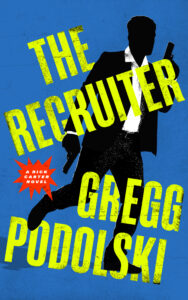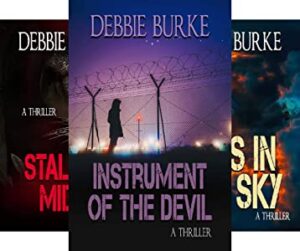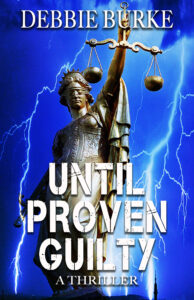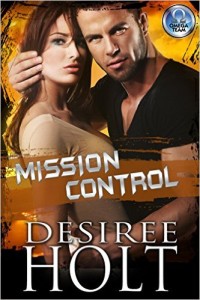by Debbie Burke
Let’s flashback to September 2020 when an anonymous Brave Author submitted a first page entitled The Recruiter for critique. I was fortunate to be the critiquer. The page demonstrated excellent craft skills. The first-person voice was both funny and grim, reminding me of Raymond Chandler, my all-time favorite author.
It was also a difficult page to critique because there was almost nothing wrong with it. Comments from other readers were overwhelmingly positive.
I’m always glad when a Brave Author steps forward and responds to feedback. This BA shed his cloak of anonymity and introduced himself as Gregg Podolski.

Gregg Podolski
A subject we often discuss here at TKZ is the right place to begin a novel. Gregg recognized this scene, although action-packed, was not the best beginning.
Another frequent TKZ subject is “Killing your darlings.” This is always a difficult decision for authors to make. Fortunately, Gregg realized that, as much fun as he had writing the scene, and, despite favorable feedback comments, this page had to go.
Other readers and I asked Gregg to let us know when the book was published.
But…from first page critique to publication is often a loooooong journey. I wasn’t holding my breath because many good novels unfortunately don’t see the light of publication.
Then, in 2022, Gregg emailed me to say Blackstone Publishing would release The Recruiter in July 2024.
Wow! Wonderful news!
He also mentioned I was the first person outside his family to read and offer feedback on the story. That made me feel good because it’s especially rewarding to see a piece I’d admired come to fruition.
 Several weeks ago, Blackstone sent me an ARC (advanced review copy) which I’d requested.
Several weeks ago, Blackstone sent me an ARC (advanced review copy) which I’d requested.
I’m pleased to say the book far exceeded the potential shown back in 2020 in that original first page.
The Recruiter is a tense, gritty, contemporary noir thriller with hard-boiled echoes of Philip Marlowe and Sam Spade. It’s in the first-person point of view (POV) of Rick Carter, a world-weary alcoholic who deserted his wife and children. He earns a living by recruiting assassins, gun runners, and assorted unsavory thugs to do dirty work for wealthy, powerful clients concerned with preserving their upstanding reputations.
Yeah, I know. Rick Carter sounds more like a villain. Yet Gregg managed to infuse enough humor and humanity into this anti-hero to keep me reading and fascinated.
I invited Gregg to discuss his journey from first page critique to publication in today’s interview.
Debbie Burke: Gregg, welcome back to TKZ and big congratulations on the upcoming release of The Recruiter! Where did the idea of an executive recruiter for criminals come from?
Gregg Podolski: Thanks so much for having me, Debbie! As far as the idea, I’ve been a professional recruiter for the last 17 years, and it dawned on me that there really wasn’t a lot of books about my profession in the fiction world. I didn’t just want to do a John Grisham book but with recruiters instead of lawyers, though. Instead of writing about a recruiter who was a good guy caught in a bad situation, I thought it would be more unique—and more fun—to write about a guy who recruits bad people to help other bad people do bad things. See if I could turn a character who would be a secondary villain in a typical thriller into the protagonist of an entire novel.
DB: How long have you been writing? Have you attended classes, workshops, or conferences? Any previous publications?
GP: My first short story, “The Horse Raised by Wolves,” was published in Highlights Magazine when I was 7 years old. Six years later, in 8th grade, I wrote my first thriller novella, “Poison 101,” which my dad submitted to Reader’s Digest, but was rejected with a very nice letter from their editor who encouraged me to keep writing. Both stories are available to read on my website, greggpodolski.com, for anyone who’s interested. I’ve been writing ever since, with no specific training or extra classes. I wrote two full novels, half of another one, and a collection of humorous essays before writing The Recruiter during the early days of the pandemic in 2020. None of those earlier works were published, though a few got some mild interest from agents.
DB: Your lead character Rick Carter starts off as a big jerk. When you originally envisioned the story, did you have his entire character arc/transformation in mind? Or did he evolve during the writing process?
GP: I always knew this book was going to be about Rick reconciling the man he used to be with the man he’s become, but how he accomplished that definitely evolved as I wrote. The biggest change is evident if you compare the first page you critiqued with the character he is in the finished novel. The guy you met in that since-discarded first page was a little tougher than the guy he turned into. I just really liked the idea of writing a book in which the action hero is kind of bad at the action stuff.
DB: The plot of The Recruiter has many reversals, course changes, and surprise twists. I gotta ask—are you a plotter, a pantser, or a combination?
GP: Definitely a combo. I always know how a book will begin and end before I start, and then the connecting story beats come to me as I go. My phone is filled with notes ranging from a single line of dialogue to an outline for an entire scene. I type them up as they come to me and then try to work them in wherever they make sense. So, in a way, I sort of plot as I pants.
DB: Can you share the process you went through to get The Recruiter accepted for publication?
GP: I always knew I wanted to go the traditional publishing route, as I am far too lazy to self-publish. The Cliff’s Notes version is that I wrote the first draft from March-June of 2020, revised it twice, then started querying agents in September. By June of 2021, I had racked up around 50 rejections/no responses and two offers. I picked the one who I felt best connected with both me and my manuscript, then we revised it again over the summer. We went out on sub right before Thanksgiving and I received the offer from Blackstone Publishing in March of 2022.
DB: In the epilogue, you left the door open for more adventures with Rick Carter. Is another Recruiter book in the works?
GP: Not only in the works but written and submitted to Blackstone, waiting for their approval! I would love nothing more than to turn this into a book-per-year series, for as long as readers are interested in seeing what Rick gets up to next.
DB: Anything else you’d like to add?
GP: Just to say how appreciative I am of you and the entire TKZ community. I’m more of a lurker than a commenter, but I check the site every day as part of my morning routine, and recommend it regularly to anyone looking for writing advice. The feedback you provided on my first page critique and the wealth of knowledge and encouragement in the comments section was exactly the boost of confidence I needed as I dove into the query trenches, even if that first page remains in my Deleted Material file. That’s why this interview is so special to me, and is without a doubt one of the most meaningful I have done or will do. Thank you all!
- Blackstone Publishing (official website)
- Amazon
- Barnes & Noble
- Bookshop
- Indigo Chapters(Canada)
- Books A Million
~~~
TKZers: I coaxed Gregg out of lurking in the shadows. Feel free to ask him questions in the comments and he’s happy to answer.












